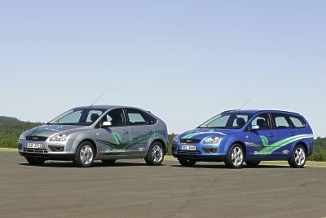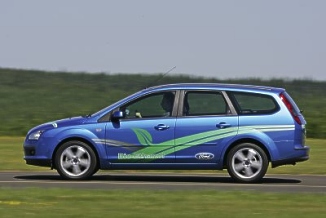
.
November 09, 2005
.
This Week:
-
New Saab 9-5 Makes North American Debut at New England International Auto Show
-
Positive Sales Development Continues at the Mercedes Car Group in October
-
BMW Group's Chris Bangle Will Open Design Los Angeles Conference at LA Auto Show
-
DaimlerChrysler Is First Company to Provide Vehicle Financing for Both Cars and Trucks in China
-
Toyota Hits Milestone of Ten Million Engines Produced in North America
© 1998
- 2005 Copyright &
Disclaimer
Automotive Intelligence,
www.autointell.com
All Rights Reserved .
For questions please contact
editor@autointell.net
|
.
PARIS, FRANCE – French consumers could soon join the growing number of Europeans driving environmentally advanced vehicles by ordering a new Ford Focus Flexi-Fuel vehicle (FFV) or Ford Focus C-MAX FFV capable of running on bio-ethanol. The announcement in Paris today that Ford of Europe is prepared to launch Flexi-Fuel Vehicles in France underlines and strengthens Ford's leadership position as the top manufacturer of bio-ethanol-powered vehicles in Europe.
|
|
Taking the Initiative
With today's announcement, Ford aims to break through the common problem of how to encourage consumers to adopt new vehicle technology before an adequate fuel infrastructure exists. Ford has asked other societal stakeholders to join and share in their responsibilities in a concerted effort to making mobility more sustainable.

Photos: Ford
“This effort depends on the political willingness to increase the use of bio-ethanol as a fuel for the transport sector, and on the fuel availability” said Wolfgang Schneider, vice president, Governmental and Environmental Affairs, Ford of Europe. "New societal challenges need new societal approaches and responses. The ongoing positive public resonance on Ford's efforts in the area of FFV technology demonstrates that we are on the right path.
Schneider added: “We consider FFV technology to be of critical importance to make mobility more sustainable and that is why Ford will continue to explore and support other bio-ethanol initiatives across the continent.”
Delivering truly flexible FFV models
Today's announcement by Ford France follows similar initiatives in other European markets and the success-story of Ford's FFV technology in Sweden. It's the Swedish example that shows what can be accomplished through cooperation and partnership between companies from different industries (including fuel providers and distributors), as well as local and national government and non-governmental organizations (including fleet and private customer associations).
Since the market introduction of the first generation Focus FFV in Sweden in 2001, more than 15,000 Ford FFVs have been sold. This accounted for 80 percent of all Focus sales and 80 percent of sales of environmentally friendly cars in Sweden in 2004. The most recent data shows that 40 percent of all Ford sales in Sweden are FFVs.
Both the new Focus and the Focus C-MAX FFV models also went on sale in Germany in August of this year.
In addition, Ford is participating in multi-stakeholder pilot projects in the UK, Ireland and Spain aimed at exploring and testing the potential for large scale application in these markets. Other European market initiatives are expected to follow soon.
With these latest developments, Ford remains the pace-setter and leading car manufacturer for ethanol-powered vehicles in Europe. FFVs are part of Ford's broad portfolio of environmentally advanced vehicle technologies and its commitment to develop and offer them as an affordable alternative for our customers.
Ford's FFV models are capable of running on E85 and petrol or any mix of both in one fuel tank, making them truly flexible, both in terms of the choice/availability of fuel and customer operation.
Renewable Fuel
Bio-ethanol is a renewable fuel derived from plants (such as cereals, sugar beet etc.) or biomass (such as wood waste). The primary environmental benefit is the reduction of CO2 (carbon dioxide) emissions – the main greenhouse gas thought to be responsible for global warming.
When using biomass or plant based material to derive bio-ethanol fuel, the CO2 circle can, to large degree, be "closed-loop." The photosynthesis process of plants sees carbon dioxide absorbed by the plants, etc during their growth only to be released as the bio-ethanol is used as fuel.
A Global Commitment
On September 21, Ford Chairman and CEO Bill Ford laid out his blueprint for the company's future, focusing every aspect of the business on innovation as its core strategy going forward. This includes a commitment to FFVs throughout Ford's global operations. In North America, four new vehicles for 2006 can run largely on ethanol, with an expected production of up to 250,000 FFV units in 2006 there. In Thailand, Ford has only recently introduced a version of its successful Focus model capable of running on regular petrol as well as on a specific bio-ethanol/petrol blend offered in that market. In Brazil, FFV and dedicated bio-ethanol technology are already long established alternatives to conventional technologies.
In the past decade, Ford has put out more than one million ethanol-powered vehicles on the roads worldwide.
(November 4, 2005)
| .
Homepage News Companies Management Publications Events Guestbook Search . |
